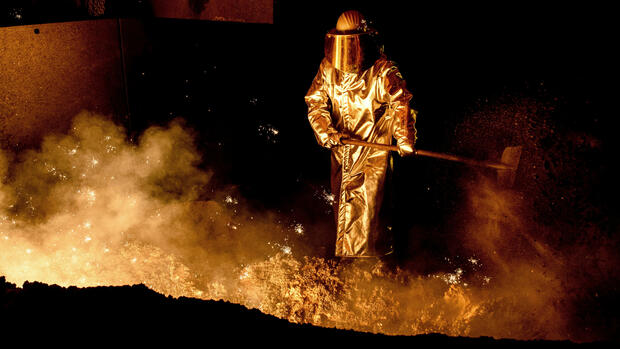In the future, the group wants to produce 2.5 million tons of steel per year in a so-called direct reduction plant.
(Photo: dpa)
Dusseldorf After a long wait, the EU Commission has given its approval for Thyssen-Krupp to receive billions in funding from the federal government and the state of North Rhine-Westphalia (NRW). This was announced by the EU Commission on Thursday in Brussels.
The EU has been examining for two years whether the public sector can support the Essen steel group with two billion euros in the construction of a modern production plant. The approval that has now been given is not yet a final decision on funding: the federal government still has to work out its exact structure and schedule. But approval is an important step in the process.
At the end of 2026, a so-called direct reduction plant for steel production is scheduled to go into operation and produce 2.5 million tons of steel annually – first with natural gas and then with green hydrogen, i.e. hydrogen produced by electricity from renewable sources. That would be crucial to stem the emission of climate-damaging substances. Since the Economics Ministry had agreed to start the project early, Thyssen-Krupp was able to start work at the Duisburg site.
Discrepancies lead to chaos in promotion
The total cost of the project is around 2.7 billion euros, according to corporate circles. With the planned funding of around two billion euros, the federal government is to provide aid of 1.3 billion, the state of North Rhine-Westphalia is supporting the industrial group with funding of 700 million euros. The group itself has to pay for 700 million.
The process is difficult: disagreements between Berlin, the EU Commission and Thyssen-Krupp had delayed the EU approval and thus the funding decision since 2021. While there were no more changes from the group or federal side in the case of an application from steel competitor Salzgitter AG, there was still potential for discussion on several occasions with regard to the funding application for Thyssen-Krupp, as the Handelsblatt learned from company circles.
For the group, the funding decision would mean planning security in difficult times. Thyssen-Krupp not only slipped deep into the red in the second quarter of the 2022/23 fiscal year with a loss of 223 million euros. In addition, the search for a partner for the company’s steel division, Thyssen-Krupp Steel, has been difficult for years, according to information from the Handelsblatt from corporate and financial circles. The group cannot cover the investments required for green steel production on its own.
Along with Thyssen-Krupp, Arcelor-Mittal and Saarstahl are also waiting for a funding release. All in all, it is about state subsidies of six billion euros for these three steel companies and Salzgitter.
More: New Thyssen Krupp boss is pushing for speed in the restructuring of the company
